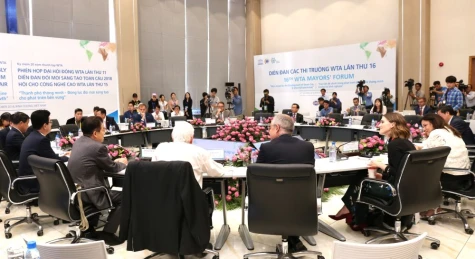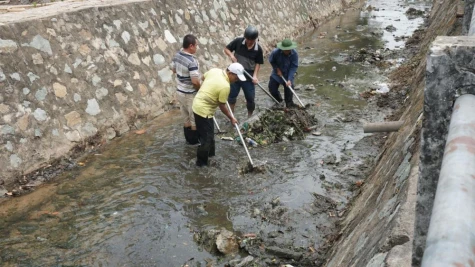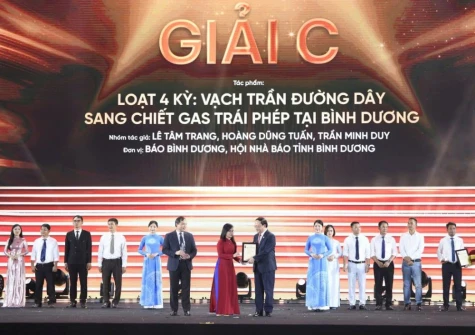Domestic solid waste must be classified at each household from the beginning of this year, according to the Law on Environmental Protection 2020, which is considered a breakthrough step towards turning waste into resources.

It will also help reduce pressure on the domestic solid waste treatment process.
To put the regulations into place, professional agencies and local authorities have circulated many technical documents, invested in technical infrastructure and human resource, and are offering education to raise public awareness.
Obstacles to waste classification
Statistics from the Ministry of Natural Resources and Environment (MoNRE) show that the amount of domestic solid waste continues to rise, across all local areas and across the country.
Currently, the total amount of solid waste generated exceeds 67,800 tonnes per day, with urban areas producing 38,100 tonnes per day and rural areas generating 29,700 tonnes per day.
Nguyen Thanh Lam, an official from the Department of Environmental Pollution Control under the MoNRE, said that waste classification is still not being implemented synchronously in localities.
Many rural and mountainous areas do not have enough domestic solid waste collection services and lack collection and transportation equipment.
They also lack properly regulated waste collection sites, leading to prolonged backlogs of domestic solid waste and causing environmental pollution.
Investment capital mainly comes from the State budget, and official development assistance (ODA), while contributions from the private sector remain limited.
Up to 75% of domestic solid waste treatment facilities continue to rely on State support for their operations.
To deal with the growing issue, the Law on Environmental Protection 2020 stipulates that from this year, solid waste generated from households and individuals has to be divided into three groups.
Group one consists of solid waste that can be reused, including paper, plastic, metal, glass, fabric, leather, wood, rubber and electronic equipment.
Group two comprises food waste, from leftover food to expired food, vegetables, and fruits.
Group three is other household solid waste such as hazardous waste, bulky waste and others.
Notably, Clause 2, Article 77 of the Law on Environmental Protection 2020 stipulates that facilities collecting and transporting domestic solid waste can refuse to collect and transport domestic solid waste from households and individuals that do not classify or use packaging according to regulations.
They can also notify competent authorities for inspection and handling according to the law.
Chairman of the Vietnam Clean Air Network and former deputy director of the Environment Department under the MoNRE Hoang Duong Tung said that the Law on Environmental Protection 2020 was issued by the National Assembly to replace the old one promulgated in 2014.
The new law includes many innovative contents towards creating a circular and green economy.
For household waste management, this marks the first time that waste sorting is mandatory at source, rather than merely encouraged as in previous laws.
In addition, polluters must pay fees according to the amount of waste discharged, and must dump waste within specific deadlines and in the correct location.
Units providing collection, transportation and treatment services must meet technical and infrastructure requirements in accordance with regulations.
However, surveys have shown that most people remain quite confused in how the new law should be implemented and how this fits with what some authorities have already imposed in terms of their own plans for classifying waste.
Households still do not clearly understand how to classify waste, how to pay for waste collection or where and how to dump classified waste.
For staff working in environmental protection and solid waste management facilities at district and communal levels, there is also little understanding and support.
Infrastructure for collecting and treating domestic solid waste is not uniform. Many concentrated landfill areas lack treatment systems, thereby causing environmental pollution.
Moreover, waste treatment plants are hesitant to even accept domestic waste. The reason is that cost for collection and transportation services is low. Waste collection workers in rural areas have low incomes, so it is difficult to attract and retain staff.
The awareness of some people is still limited, with many believing that rubbish collection is solely the job of environmental workers.
Putting regulations into practice
Director of the Department of Environmental Pollution Control Hoang Van Thuc said that the MoNRE had issued the Circular No 02/2022/TT-BTNMT on January 10, 2022 detailing a number of articles of the Law on Environmental Protection 2020.
Based on the guidance document, localities will need to develop their own guidelines to suit their area.
In parallel, the MoNRE promulgated 'Technical guidelines on classification of domestic solid waste', providing maximum identification of types of domestic solid waste generated from households and individuals and classifying them into three main waste groups in accordance with regulations in Clause 1, Article 75 of the Law.
The technical manual also includes illustrations and clear instructions on how to prepare and clean basic types of waste before sorting.
For example, waste paper, plastic and metal need to be flattened, and reduced in size and volume. For fabrics, leather, and wooden products, they can be reused if they are clean, intact or shrunk. Electrical and electronic devices should be kept in their original shape and should not be disassembled.
The MoNRE sent documents requesting provincial and municipal people's committees to study and apply technical guidelines on classification of domestic solid waste to ensure compliance with the Law and related guiding documents.
Associate Professor Bui Thi An, director of the Institute of Natural Resources, Environment and Development, said that classifying domestic solid waste at source was very good policy and everyone should try to implement it.
The Government needed to have specific and fundamental instructions for each province and locality, she said.
In addition, local authorities are responsible for arranging and selecting infrastructure for collecting, transporting and treating domestic solid waste, supervising the implementation, guiding people, and promulgating detailed regulations on prices for collection, transport and treatment services for domestic solid waste.
At the same time, they must provide people with the easiest ways and means to classify waste such as rubbish bins, disposal sites, collection and transportation times.
They were important factors that determine the success of the policy, said An.
The Hanoi Department of Natural Resources and Environment has issued many documents providing technical guidance on classifying domestic solid waste.
Ba Dinh district was the first to pilot waste classification at source in three wards starting April 1 last year, expanding to all 14 wards by November 1.
Hoan Kiem district deployed the waste classification at its source in all 18 wards from July 1 last year.
Dong Da and Hai Ba Trung districts implemented the new classification in one ward each, while Nam Tu Liem district applied it in two wards.
Nguyen Van Quy, head of the Solid Waste Management Division under the Hanoi Department of Natural Resources and Environment, said that, with the active participation of authorities at all levels and consensus of the people, after a pilot period, positive results have been achieved./.
VNA

























